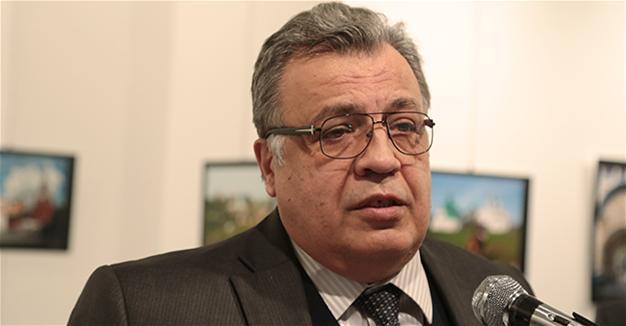Questions on Karlov killing linger as probe deepens
Fevzi Kızılkoyun - ANKARA

AP photo
New questions have arisen over the killing of Russian Ambassador to Turkey Andrey Karlov, as police deepen their probe with fresh detentions.
Police detained a total of 11 people on Dec. 21 over the assassination, which was committed by police officer Mevlüt Mert Altıntaş.
According to the newly obtained information regarding the killing of the assassin, two traffic police officers near the scene initially intervened before special forces arrived.
After Altıntaş refused to surrender, police staged their first intervention at 7:27 p.m., with the first bullet striking him at 7:32 p.m.
He was wounded in his left leg in the clashes and changed the charger of his weapon after two minutes at 7:34 p.m., continuing to fire at police.
He was shot in the neck at 7:40. The clashes ended at 7:42 after Altıntaş had been shot with four bullets in his feet and the groin area, along with two shots to the chest. The bullet that resulted in his death entered from his neck.
An operation was conducted against the people Altıntaş was in contact between 2012 and 2014.
On Dec. 20 police detained Altıntaş’s uncle, who had been working at a now-closed school allegedly linked to the movement of the U.S.-based Islamic preacher Fethullah Gülen, the main suspect in the case into the July 15 coup attempt, in the Aegean resort town of Kuşadası, but he was later released.
Hasan Furuncu, Altıntaş’s uncle, and Süleyman Ergen, who is suspected to have links to the Gülen network, were among the detained people, Doğan News Agency said. Police officers were also among the people detained.
Altıntaş’s cellphone was being investigated by officials and four passwords were found on his phone. Officials are attempting to deduce whether the passwords will give them a lead as to who was behind the murder.
Police are also investigating security footage from the Contemporary Arts Center, where the assassination was carried out.
An investigative team from Russia met anti-terrorism police in Ankara on Dec. 21 as part of a joint probe into the assassination.
Altıntaş’s autopsy procedures have been completed but no one wanted to claim the dead body.
Altıntaş booked a hotel room close to the scene of the attack on Dec. 14 for Dec. 16 and 17, but then changed it to Dec. 18 and 19 after learning that the exhibition was on Dec. 19.
Police interviewed a female hotel worker who gave Altıntaş his suit from cleaning.
Police have also found footage of Altıntaş from Dec. 16 and took the witness testimonies of security personnel at the Contemporary Arts Center.
Altıntaş was involved in an investigation into the Gülenists in 2015. He participated in Gülenist meetings in İzmir, according to a report dated Aug. 13, 2015.
Another possible Gülen suggestion was noted in the column of daily Hürriyet columnist Abdülkadir Selvi, who wrote on Dec. 21 that the assassin participated in eight programs of President Recep Tayyip Erdoğan in the Turkish capital Ankara after the July 15 failed coup attempt.
“He was in the unit that provided domestic security after the presidential guards. God forbid, he could have also acted there,” he also wrote.
Noting that what Altıntaş did on the night of the thwarted coup is unknown, Selvi noted that “the FETÖ member police officer” took a one-day leave of absence around 7:45 a.m. on July 15 in Ankara.
Muharrem Sarıkaya from daily Habertürk also questioned the possible Gülen links of Altıntaş.
“The schools and courses that he went to, his family data display his connections,” Sarıkaya wrote.
Sarıkaya also said police shot him dead because they thought he might have been a suicide bomber, quoting a policeman who was involved in the operation.
Nedim Şener, a columnist from daily Posta, said the school Altıntaş went for university exams was linked to the Gülenists in the Söke district of the western Aydın province, his hometown.
Altıntaş’s education expenses were met by Şahin İlgi, a businessman on the run from the Gülen probe, Şener noted.
Banu Şen from daily Hürriyet spoke to the people who knew Altıntaş in Söke, with many voicing surprise at his actions.
“Altıntaş was born on June 24, 1994. He was in Söke until high school. According to the allegations, he registered at the Körfez course for a while, which is now closed,” she wrote, before citing what Altıntaş’s teacher from high school said about him.
“He was a joyful and good child. He didn’t harm anybody or cause any unrest,” the teacher, who wished to remain anonymous, told daily Hürriyet.
